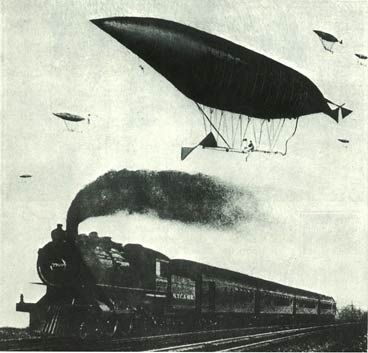There must be good money in making predictions because no one would go into the business for job satisfaction.
If you correctly foresee events a century before they occur, none of your contemporaries will still be alive to remember your predictions. Furthermore, the marvels you forecast—manned flight, say, or the internet—will seem inevitable and obvious after the fact, robbing you of any credit for foresight. And if you’re wrong, you’ll probably sound ridiculous.
Yet each new year, a new batch of predictors offer us their forecasts for the future. Most are promptly forgotten. One who deserves to be remembered, though, is John Elfreth Watkins, Jr., a Post writer in the early 20th Century. Back in December 1900, he wrote his ideas about “What May Happen in the Next Hundred Years” for the Post’s sister publication, the Ladies’ Home Journal.
Where he was wrong, he was very, very wrong:

Nicaragua (i.e. Panama) will ask for admission to our Union after the completion of the great canal. Mexico will be next. Europe, seeking more territory to the south of us, will cause many of the South and Central American republics to be voted into the Union by their own people.
There will be No C, X or Q in our every-day alphabet. They will be abandoned because unnecessary.
Mosquitoes, house-flies and roaches will have been practically exterminated… There will be no wild animals except in menageries. Rats and mice will have been exterminated. The horse will have become practically extinct.
A man or woman unable to walk ten miles at a stretch will be regarded as a weakling.
A university education will be free to every man and woman.
Food will be served hot or cold to private houses in pneumatic tubes… The meal being over, the dishes used will be packed and returned to the cooking establishments where they will be washed… These tubes will collect, deliver and transport mail over certain distances, perhaps for hundreds of miles.
But this selection is hardly fair to Watkins. Some of his predictions were only partly wrong.
Trains will run two miles a minute, normally; express trains one hundred and fifty miles an hour.
High-speed trains are traveling over 300 mph. Just not in the United States.
Automobiles will be cheaper than horses are today.
This is just barely true. In 1900, work horses sold for $225 to $250. Adjusting for inflation, that price is approximately $6400, which will buy a new, low-end, import, budget car.
[The future American] will live fifty years instead of thirty-five as at present.
In fact, the overall life expectancy in 1900 was 47.8 years. And in 2000, it was 77.
There will probably be from 350,000,000 to 500,000,000 people in America and its possessions by the lapse of another century.
The figure is high, but at least Watkins was guessing in the right direction. America’s population had grown 14000% between 1800 and 1900. If that rate had continued, the total would have exceeded 1 billion in 2000. Instead, it grew just 360%, reaching 280 million at the start of the new century.
Where Watkins was correct, however, he was unusually far-sighted.
Americans will be taller by from one to two inches.
The average American male in 1900 was 66-67” tall. By 2000, the average was 69”.
Photographs will reproduce all of nature’s colors… [They will be transmitted] from any distance. If there be a battle in China a hundred years hence, snapshots of its most striking events will be published in the newspapers an hour later.
Wireless telephone and telegraph circuits will span the world. A husband in the middle of the Atlantic will be able to converse with his wife sitting in her boudoir in Chicago. We will be able to telephone to China quite as readily as we now talk from New York to Brooklyn.
Man will see around the world. Persons and things of all kinds will be brought within focus of cameras connected electrically with screens at opposite ends of circuits, thousands of miles at a span.
Rising early to build the furnace fire will be a task of the olden times. Homes will have no chimneys, because no smoke will be created within their walls.
Refrigerators will keep great quantities of food fresh for long intervals.
Fast-flying refrigerators on land and sea will bring delicious fruits from the tropics and southern temperate zone within a few days. The farmers of South America… whose seasons are directly opposite to ours, will thus supply us in winter with fresh summer foods which cannot be grown here.
There is one last peculiarity to Watkins’ article.
Every one of his predictions involved an improvement in the lives of Americans. He saw only positive change in the new century. Today’s predictors don’t see the future so optimistically, but will they see it as clearly as Watkins?
Become a Saturday Evening Post member and enjoy unlimited access. Subscribe now




Comments
On the case of seeing only positive change….. are “giant guns”, “aerial war-ships” (think helicopter gunships and fighter jets), “forts on wheels” (think tanks and armoured personnel carriers) and flying machines with hundred-mile telescopes (think military satellites) really improvements to our lives?
He foresaw also that coal and oil would become more expensive as they began to run out and that we would increasingly need to turn to hydroelectricity for power; possibly not until 2100 though!
Oops…. I was wrong, he did say that horses would become “practically extinct”…. but was talking in relative terms. The working horse IS practically extinct and he did say that the rich would still keep them for racing, hunting and exercise. Which they do. And most of us rarely see a horse from one month to the next, whereas they were part of daily life in cities and countryside alike in 1900.
Watkins’ did not predict that the horse would be “practically extinct” but that the horse *in harness* would be as scarce as yoked oxen already were in 1900.
I should have added, the author was probably thinking of the balance being upset and European powers co-operating in dividing up Latin America against U.S. wishes. Even with the First World War that would have been practical as late as 1939 if U.S. forces weren’t invited in (i.e., leading to joining the U.S.A.), and he probably didn’t foresee the decline caused by the World Wars.
It was never the Monroe Doctrine on its own that stopped European expansion into the more convenient parts of Latin America before the U.S.A. became a great power (say, in the 1880s or ’90s). Before that the U.S.A. was a second rank power, almost negligible away from its frontiers, but diplomacy coupled with European divisions and interests in not having to cover the overheads of occupation usually stopped that sort of penetration. So you had (say) Britain owning the Argentinian railways but not paying for its police, thus having an interest in stopping Germany taking over, and so on.
This is a very interesting article. I especially like the final prediction of the old article, which sounds like MRI and x-ray technology.
He didn’t predicted the new religion that keep people obsessed 24 hrs a day – Reality television series.
his population predictions are rather low, if you consider that he thought all of latin america would be part of the US
He wasn’t completely wrong about some of the things listed under completely wrong:
University education is free in many countries. And though we don’t receive food in tubes, food is of course delivered to us by a person in a car, which is close enough. Many smaller restaurants in China do in fact send their dirty dishes away to have them washed, and get clean ones back, wrapped in plastic.
Very interesting is his view on the Union though. It is a bit sad to see how the world has changed its view of the Union a century later.
“High speed trains” is not the only prediction which happened to be true in many countries but USA (and therefore listed as partially wrong). “University education” is virtually free to every man and woman in most European countries, and its cost fell in USA too, until Reagan took over… i.e. the resources collected by the central governments have been growing enormously throughout time, and they could indeed have been used to pay for welfare and education. Pity that USA chose to privilege the military budgets instead…
The article lists “A university education will be free to every man and woman” as being “very, very wrong”. Depending on which country you live in, this is not(!) wrong at all. In my home country Sweden, university education does not come for a fee. University education *is* free in Sweden, and many countries have the same.
You have to aquire your books somehow. However used and hand-me-down books are easy to get hold of. Then it’s just a matter of having a place to live and means to feed yourself. To this end, the state grants loans to anyone enrolled in higher education for up to six years.
I want to take the opportunity at the start of a new year to thank our loyal reader and contributor Ima Ryma.
I thought for sure he/she/they wouldn’t be able to find a rhyme for “Watkins,” but this week’s contribution cleverly avoided that problem.
Thanks for all your work.
We look forward to more.
Actually, Watkins predicted the airplane three years before the Wright Brothers’ flight. As usual, he was wrong in some details but quite far-sighted in others.
“There will be Air-Ships but they will not successfully compete with surface cars and water vessels for passenger or freight traffic. They will be maintained as deadly war-vessels by all military nations.
Some will transport men and goods. Others will be used by scientists making observations at great heights above the earth.”
Due to space restrictions, I couldn’t include all of Watkins’ predictions. Maybe I should post the entire article….
No mosquitoes, roaches or flies,
‘Twas predicted way back for now.
But they still flourish – no surprise,
And they will outlast us – here’s how.
Humankind, communicably,
Is connected quite fast and sure.
Old bugs will bring new bugs to be
Spread to all humans with no cure.
All will share new deadly virus,
And all the human species dies.
Hardy life forms will survive us –
The mosquitoes, roaches and flies.
A pessimistic prediction?
Not for a bug if you be one.
Very interesting. He didn’t mention air travel, which many believed was coming. He sure got the speed of sending photographs and the far reach of telephones. His idea of central America joining the U.S. because of European expansion was somewhat understandable given the way they carved up Africa and parts of Asia but he apparently forgot the Monroe Doctrine. All aninals gone except those in Zoos and horses and insect pests nearly extinct was a strange prediction, but if the population was as great as he expected maybe I can see why he thought so. Mr. Watkins was hardly a seer but had some interesting ideas.
I didn’t see anything about artificial satellites. I guess Godard hadn’t done his work
then.. I’m over 88 and he may have been a little low on his life span!!
Thanks, Bill Nasser